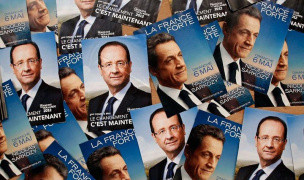 20 Terms
20 TermsHome > Terms > English (EN) > Americans with Disabilities Act
Americans with Disabilities Act
As Robert Dole proclaimed in his 1996 campaign, the 1990 Americans with Disabilities Act identified rights of America’s largest minority group: some 60 million with physical or mental conditions demanding accommodation in school, workplace and leisure. This act marked the triumph of a quiet civil rights revolution that has nonetheless changed the face of the US—from access ramps in buildings or transport to an inclusiveness of the disabled as agents as well as victims in mass media. This recognition entails a new concept of citizenship, whether confronting the “perfection” of Hollywood stars or athletes or challenging cultural stereotypes of incompleteness or inadequacy. Still, this revolution has faced criticism from those who fear the costs of accommodations, while some disabled have feared the loss of distinctive institutions and cultures as well as new inequalities.
Various categories of physical and mental difference have been identified and stigmatized in American life since their inception. Public institutions have been created at the state and local level to deal with those who are blind, deaf, mentally challenged or suffering with long-term conditions. Many were fearful and depressing places that forced those who could do so to opt for private facilities or family care. Few institutions provided any framework for a positive, collective identity, although Gallaudet University (founded in 1864 for those who are deaf) would later be the site of important 1988 student actions rejecting the perceived paternalism of a non-deaf president. Other institutions, however, forced minorities into erroneous or deficient treatments; the “deaf community,” for example, has been divided for decades over rights to American Sign Language (ASL) versus assimilative oral techniques. While disabled heroes emerged— Hellen Keller, veterans of war and labor, and even Franklin Roosevelt, confined to his wheelchair by polio—many preferred to exclude them from mainstream American life, economics and politics, or to meet their needs with paternalistic service. Indeed, Hollywood stars claimed Oscars for “acting” blind, deaf, or disabled when those living with these conditions found no work on screen. Notable and powerful exceptions include double amputee/ veteran Harold Russell as a returning sailor in Best Years of Our Lives (Best Supporting Actor, 1946) and, decades later, deaf actor Marlee Matlin’s Oscar for Children of a Lesser God (1986). It has taken even longer for media, from advertisements to narrative programs and news, to incorporate the disabled without focusing the story on them.
Various issues and movements, apart from the civil-rights model, slowly changed attitudes in the postwar period. The National Federation for the Blind, founded in 1940, marked an initial effort for socio-economic advancement organized around a shared disability. The spread of polio and the successful campaign against it brought disabilities into families and communities, and at the same time offered the possibility of a solution through concerted action. De-institutionalization and mainstreaming in the 1960s and 1970s also introduced those who had been locked away into classrooms and other social milieus.
Yet these students, workers and citizens encoun tered difficulties in both prejudice and physical access to buildings and resources. Hence Ed Roberts, who founded the Center for Independent Living in 1972 after working to change Berkeley, drew explicit parallels between the disabled and challenges facing African Americans. Meanwhile, Judy Heumann, who founded Disabled in Action in 1970, adopted protest marches and sitins to draw attention to multiple discriminations.
These movements gained real impact with provisions of the 1973 Rehabilitation Act, which barred discrimination against the handicapped in federal programs, whether by design or prejudice. Still, accommodations were often slow and ill-conceived: wooden ramps attached to back doors were symbols of difference as well as adaptation.
Moreover, while changing technologies might help some—in home-based communication for the immobilized, for example, or new extensions of materials adapted to other senses or limbs—they limited others. Those who are blind in America, for example, face 70 percent unemployment, which is exacerbated by visual dependencies in new technology like the computer screen.
Mental issues are among the most difficult categories of disability in terms of complexity and compensation. Depression, learning disabilities and syndromes like Attention Deficit Disorder, as well as classifications of alcohol and drug dependencies as disabilities have all sparked debate.
The AIDS epidemic also entailed another extension of the concept of disability in terrain fraught with moral issues for many. The recognition of new causes, syndromes and relations to genetics, environment and ergonomic patterns of work also make the category of “disabled” a perennial challenge for policy-makers.
The 1990 ADA, then, gave formal charter to a movement towards incorporative citizenship that goes beyond the publically and historically recognized categories of race, class, gender and ethnicity. In the early twenty-first century policy and accommodations are still taking shape, turning to the Supreme Court, government offices and institutional experts, as well as members of increasingly organized disabled networks to understand conditions, experience and accommodations. Only through this process will the US constitute a new and inclusive equality as well as recognize the unique potential of individuals and groups.
- Part of Speech: noun
- Synonym(s):
- Blossary:
- Industry/Domain: Culture
- Category: American culture
- Company: Routledge
- Product:
- Acronym-Abbreviation:
Other Languages:
Member comments
Terms in the News
Billy Morgan
Sports; Snowboarding
The British snowboarder Billy Morgan has landed the sport’s first ever 1800 quadruple cork. The rider, who represented Great Britain in the 2014 Winter Olympics in Sochi, was in Livigno, Italy, when he achieved the man-oeuvre. It involves flipping four times, while body also spins with five complete rotations on a sideways or downward-facing axis. The trick ...
Marzieh Afkham
Broadcasting & receiving; News
Marzieh Afkham, who is the country’s first foreign ministry spokeswoman, will head a mission in east Asia, the state news agency reported. It is not clear to which country she will be posted as her appointment has yet to be announced officially. Afkham will only be the second female ambassador Iran has had. Under the last shah’s rule, Mehrangiz Dolatshahi, a ...
Weekly Packet
Language; Online services; Slang; Internet
Weekly Packet or "Paquete Semanal" as it is known in Cuba is a term used by Cubans to describe the information that is gathered from the internet outside of Cuba and saved onto hard drives to be transported into Cuba itself. Weekly Packets are then sold to Cuban's without internet access, allowing them to obtain information just days - and sometimes hours - after it ...
Asian Infrastructure Investment Bank (AIIB)
Banking; Investment banking
The Asian Infrastructure Investment Bank (AIIB) is an international financial institution established to address the need in Asia for infrastructure development. According to the Asian Development Bank, Asia needs $800 billion each year for roads, ports, power plants or other infrastructure projects before 2020. Originally proposed by China in 2013, a signing ...
Spartan
Online services; Internet
Spartan is the codename given to the new Microsoft Windows 10 browser that will replace Microsoft Windows Internet Explorer. The new browser will be built from the ground up and disregard any code from the IE platform. It has a new rendering engine that is built to be compatible with how the web is written today. The name Spartan is named after the ...
Featured Terms
Strawberry Music Festival
Held in the capital city of Beijing Strawberry Music Festival is China's biggest rock festival. Hosted over the three day Chinese national ...
Contributor
Featured blossaries
Browers Terms By Category
- General seafood(50)
- Shellfish(1)
Seafood(51) Terms
- Contracts(640)
- Home improvement(270)
- Mortgage(171)
- Residential(37)
- Corporate(35)
- Commercial(31)
Real estate(1184) Terms
- Physical geography(2496)
- Geography(671)
- Cities & towns(554)
- Countries & Territories(515)
- Capitals(283)
- Human geography(103)
Geography(4630) Terms
- Manufactured fibers(1805)
- Fabric(212)
- Sewing(201)
- Fibers & stitching(53)
Textiles(2271) Terms
- Journalism(537)
- Newspaper(79)
- Investigative journalism(44)





